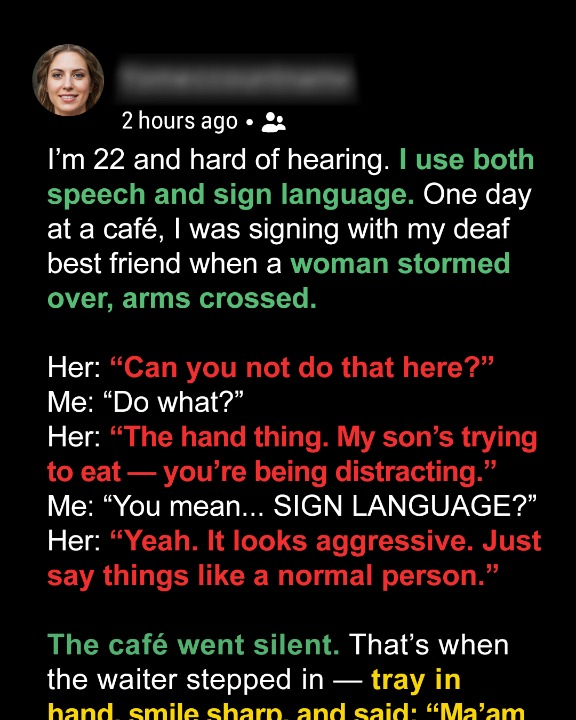
This story, narrated by Dottie, a hard-of-hearing 22-year-old, recounts a pivotal incident at a café where she and her best friend, Maya (who is profoundly deaf), were conversing in sign language. An entitled mother aggressively demanded they stop, deeming their communication “disruptive” and “inappropriate.” The entire café watched as a vigilant waiter intervened, publicly schooling the woman on respect and inclusion.
Dottie, who has been hard of-hearing since birth, navigates both the hearing and deaf worlds, using sign language fluidly. Her best friend, Maya, is completely deaf, and their seven-year friendship is deeply rooted in their shared use of sign language. They were enjoying their usual Tuesday spot, Rosewood Café, signing and laughing, when Dottie noticed a curious young boy at a nearby table watching them intently. Dottie smiled and signed “hello,” and the boy charmingly attempted to sign back.
However, the boy’s mother reacted with strong disapproval. She abruptly grabbed her son’s hands, hissing “Stop it!” and casting sour glances at Dottie and Maya. While Dottie and Maya were used to some discomfort from others regarding their signing, this woman’s sustained irritation was different. When Maya, feeling uneasy, suggested they leave, Dottie firmly refused, asserting their right to be there, though she felt the familiar knot of discomfort at having to defend her existence.
The mother then marched over to their table, demanding they “stop doing… that,” referring to their “hand gestures” which she deemed “incredibly distracting” and “aggressive.” She snapped that her son shouldn’t “have to witness this kind of… display.” The café fell silent, every eye on them. Dottie, feeling like a child again, defended their communication as sign language and suggested it was an opportunity to teach her son about diversity. The woman scoffed, dismissing it as “political correctness” and accusing them of being “selfish” for “demanding attention” and “making a spectacle of themselves.”
As the woman continued her tirade, insisting their signing looked like “casting spells” and was “weird and inappropriate,” a waiter named James approached. He calmly but firmly addressed the woman, stating, “Ma’am, I’ve been watching this entire interaction, and the only person causing a disturbance is YOU.” He eloquently defended sign language as a legitimate form of communication and condemned her harassment. Dottie felt a surge of gratitude and relief.
James then offered Dottie and Maya complimentary chocolate chip cookies, fresh from the oven. When the woman protested, James asserted the café’s commitment to treating all customers with respect and dignity, and not tolerating discrimination. A spontaneous round of applause erupted from other customers. Humiliated, the woman prepared to leave, but her son, Tyler, bravely questioned her behavior, asking, “Mom, why were you being mean to them? They weren’t hurting anyone.” He then approached Dottie and Maya and, with perfect ASL, signed “I’m sorry.” He even asked them to teach him how to sign “friend,” which Maya patiently demonstrated. As his mother dragged him away, Tyler turned back to sign “friend” one last time.
James returned with the cookies, expressing his understanding and empathy, revealing that his own brother is deaf. Dottie and Maya stayed for another hour, feeling supported by James and other customers. Reflecting on the encounter, Dottie thought of Tyler’s curious eyes and the choice to build bridges or walls, to teach wonder over fear. She left the café feeling proud, joyful, and utterly unashamed, realizing that small acts of kindness can turn an ordinary day extraordinary, reminding everyone that they deserve to exist exactly as they are.